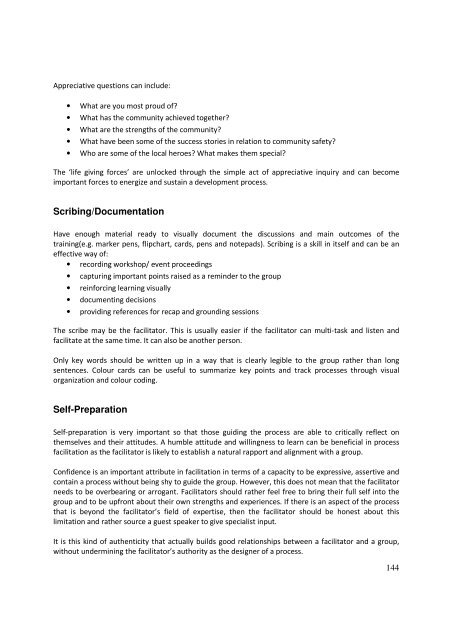ABCD-Training-of-Trainers-Tools-July-2013
ABCD-Training-of-Trainers-Tools-July-2013
ABCD-Training-of-Trainers-Tools-July-2013
Create successful ePaper yourself
Turn your PDF publications into a flip-book with our unique Google optimized e-Paper software.
Appreciative questions can include:<br />
• What are you most proud <strong>of</strong>?<br />
• What has the community achieved together?<br />
• What are the strengths <strong>of</strong> the community?<br />
• What have been some <strong>of</strong> the success stories in relation to community safety?<br />
• Who are some <strong>of</strong> the local heroes? What makes them special?<br />
The ‘life giving forces’ are unlocked through the simple act <strong>of</strong> appreciative inquiry and can become<br />
important forces to energize and sustain a development process.<br />
Scribing/Documentation<br />
Have enough material ready to visually document the discussions and main outcomes <strong>of</strong> the<br />
training(e.g. marker pens, flipchart, cards, pens and notepads). Scribing is a skill in itself and can be an<br />
effective way <strong>of</strong>:<br />
• recording workshop/ event proceedings<br />
• capturing important points raised as a reminder to the group<br />
• reinforcing learning visually<br />
• documenting decisions<br />
• providing references for recap and grounding sessions<br />
The scribe may be the facilitator. This is usually easier if the facilitator can multi-task and listen and<br />
facilitate at the same time. It can also be another person.<br />
Only key words should be written up in a way that is clearly legible to the group rather than long<br />
sentences. Colour cards can be useful to summarize key points and track processes through visual<br />
organization and colour coding.<br />
Self-Preparation<br />
Self-preparation is very important so that those guiding the process are able to critically reflect on<br />
themselves and their attitudes. A humble attitude and willingness to learn can be beneficial in process<br />
facilitation as the facilitator is likely to establish a natural rapport and alignment with a group.<br />
Confidence is an important attribute in facilitation in terms <strong>of</strong> a capacity to be expressive, assertive and<br />
contain a process without being shy to guide the group. However, this does not mean that the facilitator<br />
needs to be overbearing or arrogant. Facilitators should rather feel free to bring their full self into the<br />
group and to be upfront about their own strengths and experiences. If there is an aspect <strong>of</strong> the process<br />
that is beyond the facilitator’s field <strong>of</strong> expertise, then the facilitator should be honest about this<br />
limitation and rather source a guest speaker to give specialist input.<br />
It is this kind <strong>of</strong> authenticity that actually builds good relationships between a facilitator and a group,<br />
without undermining the facilitator’s authority as the designer <strong>of</strong> a process.<br />
144


